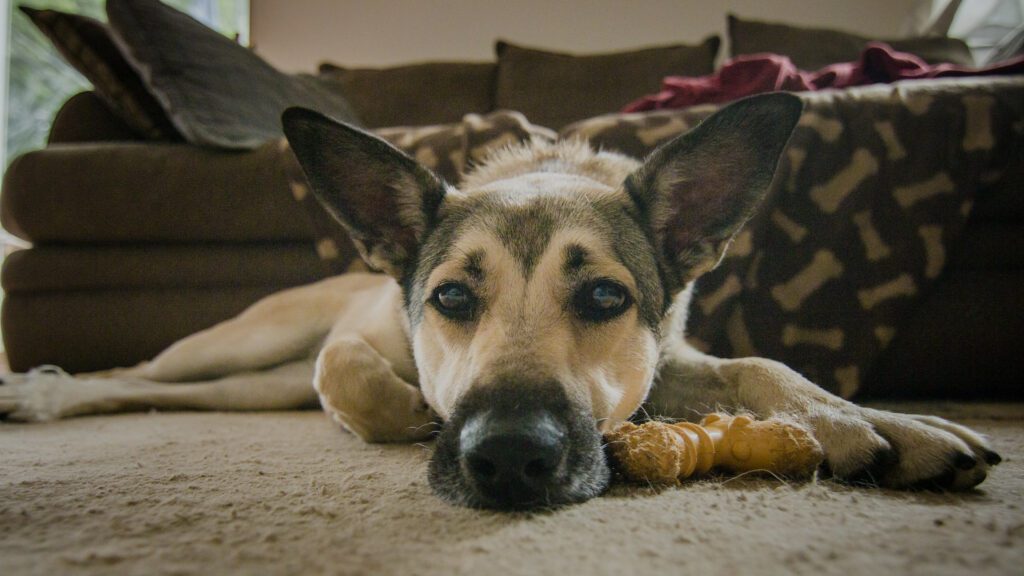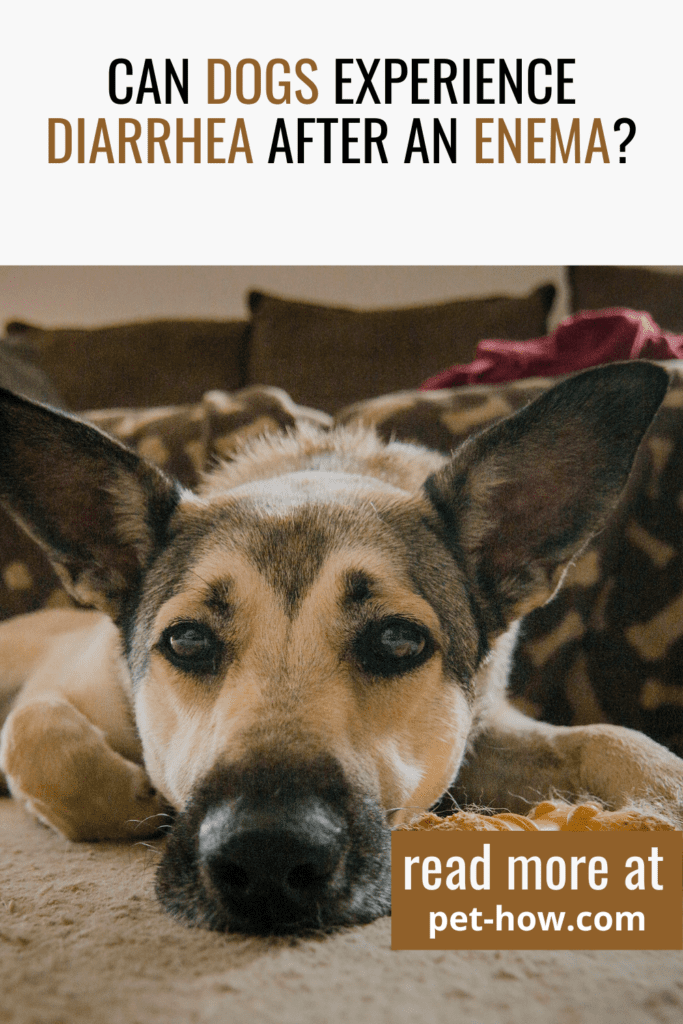Dogs can experience diarrhea after an enema procedure, although this is quite uncommon.
It’s important to be aware of the potential side effects so that you can implement appropriate post-enema care and address any underlying causes.
In this article, we’ll explore what post-enema care entails and provide tips for managing potential diarrhea episodes in dogs.
- Can Dogs Experience Diarrhea After An Enema?
- How Common Is Diarrhea As a Side Effect Of an Enema?
- Why Might an Enema Cause Diarrhea In Some Dogs?
- Pre-enema Care To Minimize The Risk of Diarrhea
- Post-enema Care To Manage Any Diarrhea That May Occur
- When To Seek Veterinary Care For Diarrhea After an Enema
- In Conclusion
Can Dogs Experience Diarrhea After An Enema?

An enema can, in rare cases, lead to diarrhea in dogs. This side effect can occur because the normal bacteria in the dog’s digestive system can be disrupted by the enema.
The enema procedure expels feces and water from the colon, including any healthy bacteria, which can unbalance bacterial levels in the digestive tract. This, in turn, can cause diarrhea.
Dogs can experience diarrhea after an enema, albeit it is not a common occurrence.
Enemas are a veterinary procedure that is used to relieve constipation or to prepare a dog for diagnostic tests or surgeries.
Even though an enema procedure can be helpful, there are potential side effects that need to be taken into consideration.
If a dog experiences diarrhea after an enema, it is important to provide them with ample water to stay hydrated.
One way to combat diarrhea in dogs is to feed them a bland diet of boiled chicken and white rice, as this will soothe the digestive system.
It is also important to monitor the consistency and frequency of the dog’s bowel movements to see if diarrhea persists or worsens.
Can Dogs Experience Diarrhea After An Enema
How Common Is Diarrhea As a Side Effect Of an Enema?
Diarrhea as a side effect of an enema is relatively rare in dogs.
Enemas are an essential medical procedure used to relieve constipation. They are commonly used to prepare dogs for diagnostic tests and surgical procedures.
While enemas can lead to the disruption of the normal bacteria in the digestive system, which can lead to diarrhea, it is not a common occurrence.
The risk of diarrhea as a side effect of an enema can be minimized by making sure that the procedure is administered correctly.
Enemas should always be performed by a qualified veterinarian to ensure that the dosage is appropriate for the dog’s size, condition, and overall health. In addition, dogs should only be given enemas when they are strictly necessary.
It is important not to give your dog an enema unnecessarily or too frequently as this could increase the risk of diarrhea.
Diarrhea is a common symptom in dogs, and it can be caused by several factors including changes in diet or bacterial infections.
If your dog experiences diarrhea after an enema, it is important to discuss the symptoms with your veterinarian.
They will be able to provide guidance on how to provide the necessary care to relieve the diarrhea symptoms effectively.
The veterinarian may recommend a bland diet along with electrolyte supplements to replace fluids lost through diarrhea.
In conclusion, while diarrhea is a recognized side effect of enemas in dogs, it is not a common occurrence.
To minimize the risk of the side effect, enemas should be administered sparingly by a qualified veterinarian, and only when they are necessary.
If diarrhea does occur after an enema, it is essential to consult a veterinarian, who can provide guidance on effective treatments.
Can Dogs Experience Diarrhea After An Enema
Why Might an Enema Cause Diarrhea In Some Dogs?
The most common cause of diarrhea from an enema is irritation of the rectal lining due to the solution being too strong or not properly mixed with water.
This can lead to inflammation and irritation, which can cause diarrhea as the body attempts to expel the irritating substance.
Additionally, if too much solution is used during an enema, it can overwhelm the dog’s digestive system and lead to diarrhea as well.
Diarrhea is a common problem in dogs and can be caused by many different things. One of the potential causes of diarrhea in some dogs is an enema.
An enema is a procedure in which liquid or gas is injected into the rectum to flush out the contents of the large intestine. It is often used to treat constipation, but it can also cause diarrhea in some cases.
In addition, some dogs may have an allergic reaction to certain ingredients contained in enemas such as mineral oil or glycerin.
These ingredients can irritate the rectal lining and cause inflammation and irritation that leads to diarrhea.
Finally, if an enema contains bacteria or other organisms that are not normally present in a healthy dog’s intestines, this could also lead to diarrhea as the body attempts to expel these foreign substances.
This type of reaction could be caused by using contaminated equipment or solutions that contain bacteria or other organisms that are not normally found in a healthy dog’s intestines.
Can Dogs Experience Diarrhea After An Enema
Pre-enema Care To Minimize The Risk of Diarrhea
Before administering an enema to your dog, there are a few steps that can be taken in order to minimize the risk of diarrhea afterward.
- Make sure to consult with your veterinarian beforehand to ensure that the procedure is appropriate.
- Prepare any necessary equipment such as lubricant, syringe, or the appropriate solution (e.g., laxatives) recommended by your vet for the enema procedure.
- Clean the area where the enema will be administered with mild soap and warm water. This way you reduce the chances of infection or irritation afterward.
- Provide your pup with plenty of fresh water throughout the day leading up to the procedure. Dehydration may increase their chances of experiencing diarrhea afterward.
- Administer a small dose of anti-diarrheal medication prior to administering an enema if recommended by your veterinarian.
Post-enema Care To Manage Any Diarrhea That May Occur
Post-enema care is an essential part of the enema procedure, and it’s important to manage any potential side effects that may occur, such as diarrhea, in dogs.
Here are some tips for post-enema care to manage diarrhea in dogs:
- Provide Water. Offer your dog plenty of fresh, clean water to avoid dehydration. Diarrhea can cause dehydration and create a life-threatening problem if there is an extended period without water intake.
- Monitor Your Dog’s food. Feed your dog small meals of a bland, low-fat diet such as boiled chicken or white rice for a few days after the enema. This will help their digestive system recover and reduce diarrhea. Avoid rich foods or foods with high fiber.
- Provide Probiotics – Probiotics are a good way to help restore gut bacteria that can be disrupted after an enema. You can introduce probiotics to your dog’s diet to help restore the balance of bacteria in the gut.
- Observe for Fever or Lethargy. If your dog is experiencing diarrhea after an enema, watch out for any lethargy, fever, or blood in the stool. These symptoms could indicate underlying medical issues that need to be addressed by the veterinarian.
- Consult With Your Vet. If diarrhea persists after the procedure or if symptoms continue for more than two days, consult with your veterinarian for additional treatment options or advice.
By following these post-enema care tips, you’ll help manage any potential diarrhea episodes that occur after an enema treatment in dogs. If you’re unsure about post-enema care, speak with your veterinarian for personalized advice tailored to your dog’s specific needs.
Can Dogs Experience Diarrhea After An Enema
When To Seek Veterinary Care For Diarrhea After an Enema
While diarrhea as a side effect of enemas is relatively rare in dogs, it can occur in some cases. If your dog experiences diarrhea after receiving an enema, it is important to monitor their symptoms and seek veterinary care if needed.
If your dog’s diarrhea is mild and they are otherwise acting normally, you may be able to manage their symptoms at home by offering them plenty of water and a bland diet. However, if your dog’s diarrhea persists for more than 24 hours or is severe, it is important to contact your veterinarian.
Other signs that indicate a need for veterinary care include:
- Vomiting – If your dog is also vomiting, it could indicate a more serious condition such as an obstruction, infection, or intestinal inflammation.
- Dehydration – Diarrhea can cause dehydration, so it’s important to monitor your dog’s fluid intake. If your dog is showing symptoms such as dry gums, lethargy, or sunken eyes, seek urgent veterinary attention.
- Blood in stool – If your dog’s diarrhea contains blood or mucus, it could indicate an underlying medical condition that requires immediate veterinary attention.
- Lethargy or fever – If your dog shows signs of lethargy or fever along with diarrhea, it’s important to contact your vet as these symptoms can indicate an underlying infection.
In Conclusion
While it is relatively rare, dogs can experience diarrhea after an enema.
If your dog experiences diarrhea after an enema, monitor their condition and seek veterinary care if diarrhea doesn’t go away in two-three days.
Taking the necessary steps to provide post-enema care and address any underlying issues will help ensure that your dog stays healthy and happy.






Leave a Reply